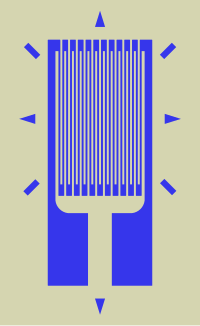
Photo from wikipedia
Model-based compensators have been widely applied in force sensors with soft materials to eliminate viscoelasticity that causes creep output and slow dynamic response and limits the performance of the sensors.… Click to show full abstract
Model-based compensators have been widely applied in force sensors with soft materials to eliminate viscoelasticity that causes creep output and slow dynamic response and limits the performance of the sensors. However, the lack of accurate characterization of high-order viscoelasticity and high computational complexity restricts the performance and application of existing methods. For the above problem, we propose a first-order Volterra gray box model-based viscoelastic compensator for force sensors with soft materials. First, the measurement mechanism of the soft-material-based force sensor is analyzed, and a gray box model for accurately characterizing the high-order linear viscoelasticity (LVE) by the first-order Volterra series is proposed, without needing high-order spring–damping parameters and their exponential operations. Then, the high-order viscoelasticity compensator is designed and directly linearly fit with the variation in the historical output, which avoids the computational complexity of the high-order creep compliance and its exponential parameters’ fitting. Finally, the proposed method is verified with a self-developed soft-material-based capacitive force sensor. The real-time experimental results show that compared with existing methods, the proposed compensator not only has better compensation performance but also has a shorter calculation time for force sensors with soft materials.
Journal Title: IEEE Transactions on Instrumentation and Measurement
Year Published: 2023
Link to full text (if available)
Share on Social Media: Sign Up to like & get
recommendations!